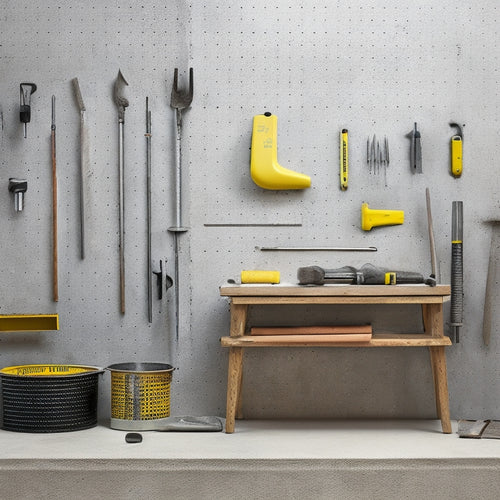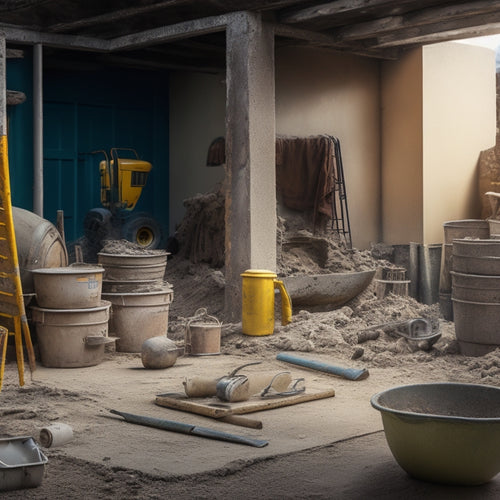
5 Crucial Measuring Tools for Concrete Installation
Share
When pouring and finishing concrete, you rely on precise measurements to guarantee the structural integrity and quality of the final product. To get it right, you'll need five vital measuring tools in your arsenal: laser levels and alignment squares to establish a level plane and verify form alignment, precision measuring tapes for accurate width, length, and depth checks, concrete block thickness gauges to confirm compliance with specifications, angle and slope detectors for precise angle calibration and slope accuracy, and depth and width calipers to verify dimensions of freshly poured concrete. Now that you know the essentials, discover how each tool can help you achieve a flawless concrete installation.
Key Takeaways
• Laser levels ensure a level plane for even concrete pours and maintain structural integrity.
• Precision measuring tapes provide high accuracy for checking widths, lengths, and depths in concrete installations.
• Concrete block thickness gauges measure thickness to ensure compliance with specifications and prevent structural issues.
• Angle and slope detectors provide precise angle calibration for exact degree adjustments in applications like stair construction.
• Depth and width calipers verify dimensions of freshly poured concrete for specification compliance in slabs and foundations.
Level and Alignment Tools
Accurate leveling and alignment are essential to guaranteeing a successful concrete installation, and you'll rely on specialized tools to achieve this precision.
Laser levels, for instance, are fundamental for establishing a level plane, confirming that your concrete pour is even and consistent. These tools project a level line or dot onto a surface, allowing you to accurately check and adjust your formwork and screed rails.
In addition to laser levels, alignment squares are another significant tool for achieving precise alignment. These squares enable you to verify that your forms are properly aligned, both horizontally and vertically, which is critical for maintaining the structural integrity of the concrete.
By using alignment squares, you can confidently verify that your forms are square and plumb, eliminating the risk of costly errors.
Precision Measuring Tapes
You'll also need to verify the dimensions of your forms and screed rails using precision measuring tapes, which provide a high degree of accuracy when checking widths, lengths, and depths. These tapes are essential for guaranteeing that your concrete installation meets the required specifications.
When selecting a precision measuring tape, look for one with high tape durability, as it will withstand the rigors of frequent use on the job site. Measurement accuracy is critical, so opt for a tape with a high level of precision, typically ±1/16 inch or better. A tape with a sturdy hook or clamp will also help you take accurate readings.
Additionally, consider a tape with a fiberglass or nylon coating, which will resist abrasion and damage from debris. By using a precision measuring tape, you can guarantee that your concrete installation is accurate, level, and meets the required specifications.
This will ultimately save you time and money by reducing the need for costly rework.
Concrete Block Thickness Gauges
When installing concrete blocks, measure their thickness using concrete block thickness gauges to guarantee compliance with architectural specifications and prevent costly rework. You can't afford to guess the thickness of your concrete blocks, as this can lead to structural issues and expensive rework.
To maintain accuracy, use a concrete block thickness gauge that provides precise measurements. Here's what you need to take into account:
-
Gauge calibration techniques: Regularly calibrate your gauge to make certain it's providing accurate readings. This involves checking the gauge against a known standard and making adjustments as needed.
-
Block density measurement: Take into account the density of the concrete blocks you're working with, as this can affect the accuracy of your measurements. Look for gauges that can compensate for different block densities.
-
Gauge durability: Choose a gauge that can withstand the rigors of the construction site. Look for gauges with durable construction and protective casings to make sure they last throughout your project.
Angle and Slope Detectors
Measuring angles and slopes accurately is indispensable in concrete installation, as even slight deviations can compromise structural integrity, and that's where angle and slope detectors come into play. You can't afford to gamble with the precision of your work, and these tools guarantee you get it right.
Angle detectors provide precise angle calibration, allowing you to adjust your work to exact degrees. This is essential in applications like stair construction, where miscalculations can lead to safety hazards.
Slope detectors, on the other hand, assure slope accuracy, which is significant in maintaining proper water drainage and preventing water accumulation. You can use them to detect even the slightest variations in slope, making adjustments on the fly to maintain ideal slope accuracy.
When working with concrete, it's imperative to maintain precise control over angles and slopes. Angle and slope detectors give you that control, enabling you to produce work that meets the highest standards of quality and safety.
Depth and Width Calipers
With precise concrete installation relying on accurate dimensional control, depth and width calipers provide the necessary precision to verify the dimensions of freshly poured concrete, guaranteeing that your work meets specifications and tolerances.
These calipers are essential for measuring the depth and width of concrete slabs, foundations, and other structures. By using depth and width calipers, you can guarantee that your concrete installation meets the required dimensions, avoiding costly rework and guaranteeing the structural integrity of the building.
When selecting a depth and width caliper, consider the following factors:
-
Digital calipers: offer high measurement accuracy and are ideal for precise measurements in tight spaces.
-
Dial calipers: provide a clear, analog display and are suitable for quick, rough measurements.
-
Vernier calipers: offer high accuracy and are commonly used in construction and engineering applications.
Frequently Asked Questions
Can I Use a Regular Tape Measure for Concrete Installation?
Can you use a regular tape measure for concrete installation? While it might seem convenient, don't rely solely on a standard tape measure. Its limitations become apparent when dealing with concrete's unique demands.
For accurate results, consider the tape's material, flexibility, and resistance to harsh environments. Instead, invest in specialized tools designed for concrete installation tips, ensuring precise measurements and a successful project.
How Often Should I Calibrate My Measuring Tools for Accuracy?
You should calibrate your measuring tools regularly to achieve accuracy.
The calibration frequency depends on usage, but as a general rule, you should calibrate your tools every 6-12 months or after 1,000-2,000 measurements.
Additionally, incorporate tool maintenance into your routine, cleaning and storing them properly to prevent damage.
Are Digital Measuring Tools More Accurate Than Manual Ones?
As you venture into the domain of precision, you're faced with an essential question: are digital measuring tools more accurate than their manual counterparts?
Think of it like steering through a precision-crafted puzzle - every piece matters. In this case, digital accuracy often trumps manual precision.
Digital tools provide exacting measurements, immune to human error, while manual tools rely on your keen eye and steady hand.
When precision is paramount, digital tools reign supreme.
Can I Use Measuring Tools in Extreme Weather Conditions?
When working in extreme weather conditions, you'll need to choose measuring tools that can withstand the elements.
Look for tools with weather resistance built-in, such as water-resistant coatings or sealed electronics.
Your tool selection will depend on the specific conditions you're facing - for example, if you're working in freezing temperatures, you'll want tools with insulated handles to prevent cold-induced errors.
Are Measuring Tools Specific to Certain Types of Concrete Projects?
As you begin a concrete project, you'll soon realize that one-size-fits-all measuring tools are a myth, like a unicorn's existence.
You'll need specialized tools tailored to specific project requirements.
For instance, a laser level is ideal for large commercial projects, while a digital inclinometer is better suited for precise slope measurements.
Don't assume a single tool will suffice; instead, choose the right tool for the job to guarantee accuracy and success.
Conclusion
You've made it to the final stage of concrete installation, and it's vital to guarantee accuracy.
The theory that precise measurements lead to stronger, longer-lasting concrete structures holds true.
By incorporating these 5 essential measuring tools into your workflow, you'll be able to detect even the slightest deviations, assuring a flawless finish.
Remember, a small mistake can lead to catastrophic consequences. Stay vigilant, and your concrete masterpiece will stand the test of time.
Related Posts
-

What Tools Do I Need for Concrete Wall Repair
As you prepare for a concrete wall repair job, you'll need a variety of tools to guarantee a successful outcome. Star...
-

10 Must-Have Tools for Concrete Repair Organization
You'll need a solid organization system to keep your concrete repair tools and materials within easy reach, protected...
-

What Tools Are Needed for Concrete Wall Foundations
You'll need a thorough array of tools and equipment to construct a concrete wall foundation that meets structural int...


